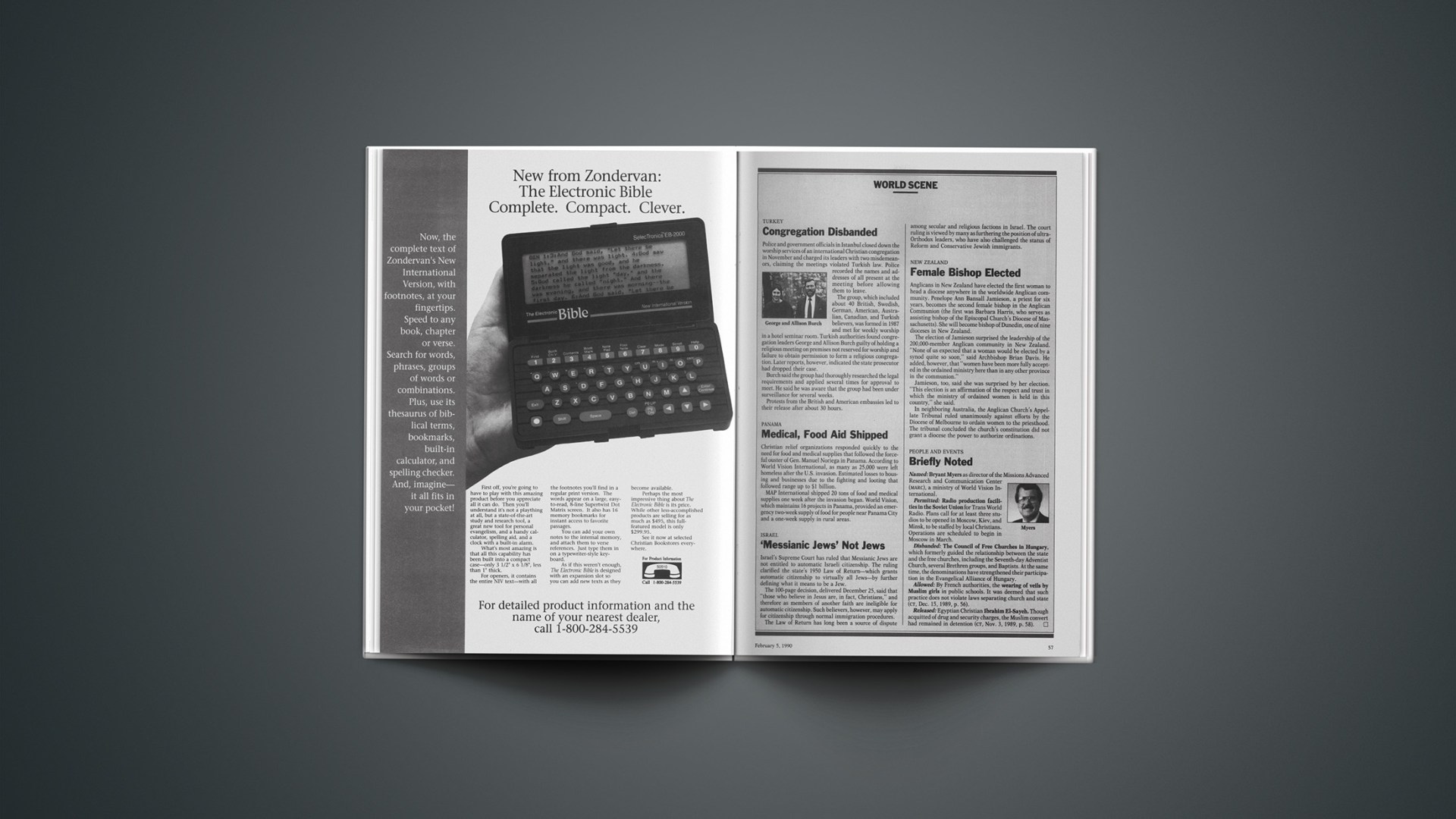TURKEY
Congregation Disbanded
Police and government officials in Istanbul closed down the worship services of an international Christian congregation in November and charged its leaders with two misdemeanors, claiming the meetings violated Turkish law. Police recorded the names and addresses of all present at the meeting before allowing them to leave.
The group, which included about 40 British, Swedish, German, American, Australian, Canadian, and Turkish believers, was formed in 1987 and met for weekly worship in a hotel seminar room. Turkish authorities found congregation leaders George and Allison Burch guilty of holding a religious meeting on premises not reserved for worship and failure to obtain permission to form a religious congregation. Later reports, however, indicated the state prosecutor had dropped their case.
Burch said the group had thoroughly researched the legal requirements and applied several times for approval to meet. He said he was aware that the group had been under surveillance for several weeks.
Protests from the British and American embassies led to their release after about 30 hours.
PANAMA
Medical, Food Aid Shipped
Christian relief organizations responded quickly to the need for food and medical supplies that followed the forceful ouster of Gen. Manuel Noriega in Panama. According to World Vision International, as many as 25,000 were left homeless after the U.S. invasion. Estimated losses to housing and businesses due to the fighting and looting that followed range up to $1 billion.
MAP International shipped 20 tons of food and medical supplies one week after the invasion began. World Vision, which maintains 16 projects in Panama, provided an emergency two-week supply of food for people near Panama City and a one-week supply in rural areas.
ISRAEL
‘Messianic Jews’ Not Jews
Israel’s Supreme Court has ruled that Messianic Jews are not entitled to automatic Israeli citizenship. The ruling clarified the state’s 1950 Law of Return—which grants automatic citizenship to virtually all Jews—by further defining what it means to be a Jew.
The 100-page decision, delivered December 25, said that “those who believe in Jesus are, in fact, Christians,” and therefore as members of another faith are ineligible for automatic citizenship. Such believers, however, may apply for citizenship through normal immigration procedures.
The Law of Return has long been a source of dispute among secular and religious factions in Israel. The court ruling is viewed by many as furthering the position of ultra-Orthodox leaders, who have also challenged the status of Reform and Conservative Jewish immigrants.
NEW ZEALAND
Female Bishop Elected
Anglicans in New Zealand have elected the first woman to head a diocese anywhere in the worldwide Anglican community. Penelope Ann Bansall Jamieson, a priest for six years, becomes the second female bishop in the Anglican Communion (the first was Barbara Harris, who serves as assisting bishop of the Episcopal Church’s Diocese of Massachusetts). She will become bishop of Dunedin, one of nine dioceses in New Zealand.
The election of Jamieson surprised the leadership of the 200,000-member Anglican community in New Zealand. “None of us expected that a woman would be elected by a synod quite so soon,” said Archbishop Brian Davis. He added, however, that “women have been more fully accepted in the ordained ministry here than in any other province in the communion.”
Jamieson, too, said she was surprised by her election. “This election is an affirmation of the respect and trust in which the ministry of ordained women is held in this country,” she said.
In neighboring Australia, the Anglican Church’s Appellate Tribunal ruled unanimously against efforts by the Diocese of Melbourne to ordain women to the priesthood. The tribunal concluded the church’s constitution did not grant a diocese the power to authorize ordinations.
PEOPLE AND EVENTS
Briefly Noted
Named: Bryant Myers as director of the Missions Advanced Research and Communication Center (MARC), a ministry of World Vision International.
Permitted: Radio production facilities in the Soviet Union for Trans World Radio. Plans call for at least three studios to be opened in Moscow, Kiev, and Minsk, to be staffed by local Christians. Operations are scheduled to begin in Moscow in March.
Disbanded: The Council of Free Churches in Hungary, which formerly guided the relationship between the state and the free churches, including the Seventh-day Adventist Church, several Brethren groups, and Baptists. At the same time, the denominations have strengthened their participation in the Evangelical Alliance of Hungary.
Allowed: By French authorities, the wearing of veils by Muslim girls in public schools. It was deemed that such practice does not violate laws separating church and state (CT, Dec. 15, 1989, p. 56).
Released: Egyptian Christian Ibrahim El-Sayeh. Though acquitted of drug and security charges, the Muslim convert had remained in detention (CT, Nov. 3, 1989, p. 58).










